
In the mid-1980s, Genesis and its spin-off projects – Phil Collins, Peter Gabriel, and Mike and the Mechanics – were enjoying hit singles galore, with hits like ‘Sledgehammer’, ‘The Living Years’, ‘Invisible Touch’, and ‘Sussudio’. But before their mid-1980s chart dominance Genesis produced some great music in the 1970s, with their very English blend of progressive rock, 12-string guitar folk, and densely humorous lyrics.
Genesis was formed at Charterhouse School by keyboardist Tony Banks, bassist Mike Rutherford, and vocalist/flautist Peter Gabriel. Drummer Phil Collins and guitarist Steve Hackett joined in the early 1970s to complete the classic quintet. This group produced sublime albums, particularly 1972’s Foxtrot through 1976’s A Trick of the Tail. 1974’s The Lamb Lies Down On Broadway was the last Genesis album to feature Gabriel, who was inspired to go solo after attending a Bruce Springsteen concert, and Collins took over on lead vocals.
The group do have weaknesses – compared to other progressive rock acts from the era like Yes and King Crimson, they’re short on instrumental firepower. However, Phil Collins is an excellent drummer. But their material is often very pretty, and they’re often shooting for beauty rather than virtuosity. Gabriel is a much stronger lyricist than the other members, and his witty lyrics make the others’ efforts look generic.
Steve Hackett left the group in 1977, and I plan to cover his solo career at some stage. The remaining trio of Collins, Rutherford, and Banks morphed into chart-topping superstars. Early albums from the trio, like Duke and ABACAB are impressive, although I’m less interested in their last few albums. Genesis was talented at writing memorable tunes, serving them well throughout their career.
Genesis Album Reviews
Favourite Album: Foxtrot
Overlooked Gem: A Trick of the Tail
From Genesis To Revelation
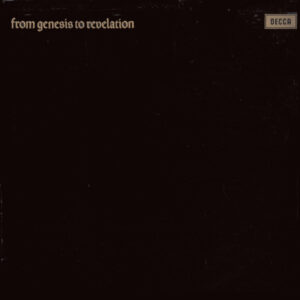
1969, 6/10
Genesis’ debut album, recorded by pop Svengali Jonathan King during the group’s school holidays, is very different from their later progressive rock material; it sounds more like an imitation of The Bee Gees or the Moody Blues, with orchestration slathered over the top. King intended to create a musical version of The Bible; the Genesis part is evident in the creation references in the first few songs, but the concept rapidly devolves into generic love songs. From Genesis To Revelation ended up in the religious section of record stores and sold a ridiculously small number of copies.
But keyboardist Tony Banks and bassist Mike Rutherford were constant members of Genesis, and while the group’s style changed significantly throughout their tenure, they generally wrote good tunes, and this teenage debut is no exception. ‘One Day’ stands out with a soaring chorus, despite its sentimentality, while closer ‘A Place To Call My Own’ uses Gabriel’s resonant voice. Some reissues append the group’s two 1968 singles, which are generally stronger than the album itself; the b-side ‘One Eyed Hound’ is a highlight, while ‘A Winter’s Tale’ has another big catchy chorus.
Genesis sound like teenagers on From Genesis To Revelation, slightly awkward and yet to establish their own distinct identity, but it’s quite astounding to think that they were only in their early twenties when they recorded masterpieces like Foxtrot and The Lamb Lies Down On Broadway.
Trespass
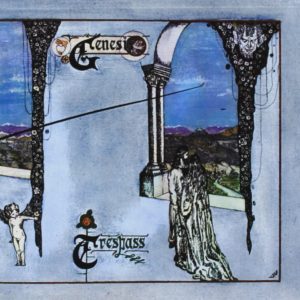
1970, 6/10
After finishing school, Peter Gabriel, Tony Banks, Mike Rutherford, Ant Phillips, and new drummer John Mayhew retreated to a remote college, where they rehearsed for 11 hours per day, living off food parcels from their parents. Despite only having three members of their classic quintet on board, Genesis already had their style figured out on Trespass. Their brand of progressive rock relies on gentle 12-string acoustic guitars, prominent organ parts, Gabriel’s croaky emotional vocals, and creative but not entirely serious lyrics based on mythology.
In terms of song writing and arrangement, the Genesis are still learning their craft on Trespass; the first side maintains a pleasant sound but tends to run together, especially in the lengthy instrumental passages, although the second half is more accomplished. The funereal ‘Dusk’ achieves an almost hymn-like atmosphere with its pretty harmonies and slow feel, but the top tier track is the closing ‘The Knife’, with its uncharacteristically aggressive sound from Philips guitar runs, Gabriel’s violent lyrics, Rutherford’s busy bass lines, and Banks’ cutting organ.
Trespass is a large step below the albums that follow it and it’s not the ideal place to start in the Genesis catalogue, but it’s very much cut from the same cloth.
Nursery Cryme
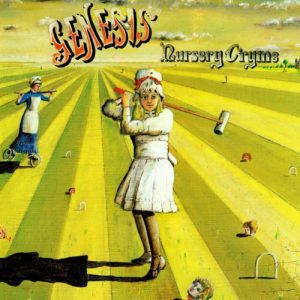
1971, 7.5/10
Although it was Genesis’ third album, Nursery Cryme was the first to feature the classic quintet; Peter Gabriel, Tony Banks, and Mike Rutherford were joined by guitarist Steve Hackett and drummer Phil Collins. Even though it’s their third album, the young group are still on an upward learning curve. ‘The Musical Box’ and ‘The Return Of The Giant Hogweed’ both have plenty of fine moments, but don’t demand attention like Foxtrot‘s ‘Watcher Of The Skies’ or ‘Supper’s Ready’.
My favourite of the longer songs in ‘The Fountain Of Salmacis’, driven by Rutherford’s bass-line. Nursery Cryme is filled out by four shorter songs, of which ‘Harold The Barrel’ is the highlight, compressing a mini-opera into three frenetic piano-driven minutes, but ‘Seven Stones’ and ‘Harlequin’ are two of the most overlooked tracks in the Genesis canon, both pretty and succinct. ‘Harlequin’ features Phil Collins’ vocal debut, singing a charming co-lead with Gabriel, while Gabriel contributes a lovely flute riff.
When taken as a whole, Nursery Cryme isn’t as consistently enthralling or thematically coherent as Genesis’ following albums with Gabriel, but on a song by song basis it is still an excellent effort. If you are interested in prog-era Genesis, you may as well start with Nursery Cryme and work your way through the group’s following four albums.
Foxtrot

1972, 9.5/10
Foxtrot is where prog Genesis’ classic phase kicks into gear; they’re more confident than before, and there are less dull instrumental passages. The key piece is obviously the sidelong epic ‘Supper’s Ready’, based on the Biblical account of the apocalypse, but the first side is also filled with good songs. ‘Watcher of the Skies’ suffers from Banks’ lyrics, but regardless it’s a strong opener with its grand Mellotron introduction, while ‘Can-Utility and the Coastliners’ tells the King Canute story with pretty organ runs. ‘Get ‘Em Out By Friday’ is typically theatrical with Gabriel using his different character voices.
But it’s the 23 minutes of ‘Supper Ready’ that’s the highlight of Foxtrot; it’s not so much a long song as thematically linked shorter songs stitched together, from the music hall of Willow Park to the intense Apocalypse in 9/8. It wheels through its different sections before its exhilarating climax with “Can’t you feel our souls ignite”.
Genesis made other great albums subsequently, but they never bettered Foxtrot.
Live
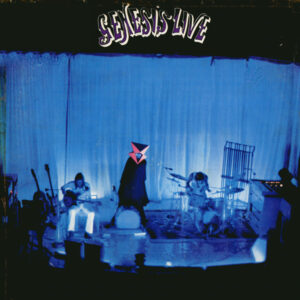
1973, 6.5/10
It must have been obligatory for every 1970s progressive rock band to create a live album, if only to prove that they were proficient enough to pull off their complex arrangements and ambitious song structures live. Genesis’ first of many live albums and the only one to feature Gabriel (although a live recording of The Lamb Lies Down On Broadway is featured on the Genesis Archive set), Live is pretty much what one would expect. The nature of the live format does predictable things to the Genesis dynamic, as some of the group’s folk mysticism is straightened out into more conventional rock arrangements. And while Banks and Gabriel largely dominate the studio records, the other members are more prominent live, with Collins’ sensitive drumming and Hackett’s guitar work more apparent.
Most disappointingly, the album’s only five songs long, and I’m sure that plenty of Genesis fans would appreciate an expanded version with ‘Supper’s Ready’ thrown in, while I’d also be curious to hear less characteristic oddities like ‘Dusk’ and ‘Harold The Barrel’ in a live setting. It would be even more interesting if the album was recorded slightly later, and took in material from the last two Gabriel albums. As it stands, Live is basically just five songs, all between eight and eleven minutes long, and this format can become wearisome, as awesome as individual tracks like ‘The Knife’ and ‘Watcher Of The Skies’ are.
Live is just your average proficient live album – if you’re enough of a Genesis nerd to want to know what ‘The Knife’ sounds like with Hackett and Collins instead of Phillips and Mayhew, you’ll want this – but more casual fans should feel free to skip it. It’s a strong set, but not comprehensive enough to be completely essential.
Selling England By The Pound
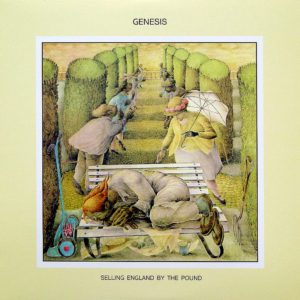
1973, 8.5/10
Selling England By The Pound is a continuation of the confident Genesis from Foxtrot. It’s a fan favourite, and is often cited as the group’s best album, but I find it a little flabby in places as some of the songs outstay their welcome. In other aspects Selling England By The Pound is a significant improvement on Foxtrot – the instrumental sections are often sharper, and the sound is clearer.
Unlike Foxtrot, Genesis are dabbling successfully in pop length songs, with the concise ‘I Know What I Like (In Your Wardrobe)’ and Collins’ vocal spotlight on ‘More Fool Me’. Selling England By The Pound also features the opening ‘Dancing With The Moonlit Knight’ and the sweetly melodic ‘The Cinema Show’. But there’s a bit too much flab on the lengthy ‘Firth of Fifth’, even though the opening piano is Tony Banks’ finest moment, while ‘The Battle Of Epping Forest’ is less engrossing than Gabriel’s other theatrical pieces.
In many ways, Selling England By The Pound is a significant step up from Foxtrot; it is better produced, more confident and the group have improved as instrumentalists, but I just don’t find it as consistently engrossing.
The Lamb Lies Down On Broadway
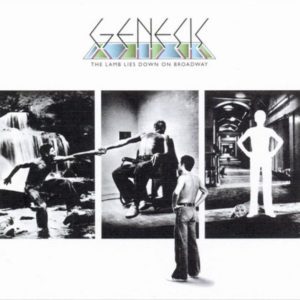
1974, 9/10
For their sixth album, each member of Genesis submitted a potential story for a thematic project. Mike Rutherford was a contender with his suggestion of a musical based on the story of The Happy Prince, but Peter Gabriel won with his seemingly incomprehensible tale of a New York street kid named Rael. Reflecting the metropolitan setting, The Lamb Lies Down On Broadway has a less pastoral feel than Genesis’ previous releases; the dark mood is set by Bank’s synthesisers and Rutherford’s bass.
The first disc is song-oriented, and features the acoustic ‘Cuckoo Cocoon’, the sexual humour of ‘Counting Out Time’, and the harshness of ‘In The Cage’ and ‘Back in NYC’. The highlight is the gorgeous ‘The Carpet Crawlers’ with harmonies between Gabriel and Collins.
The most common criticism of The Lamb Lies Down On Broadway is that the second disc is relatively uninteresting, containing too many instrumentals. While the instrumentals are not particularly interesting in themselves, their contribution to the flow and mood of the album shouldn’t be overlooked. And the calibre of the actual songs on the second disc is high; the crunching ‘Lilywhite Lilith’, the sheer beauty of ‘The Lamia’, the theatricality of ‘The Colony of Slippermen’, and the resonance of ‘it’ are more than ample compensation for a few uninteresting moments.
The Lamb Lies Down On Broadway isn’t without flaws, but it’s captivating, memorable, and emotionally resonant.
Extra Tracks 1970 to 1975
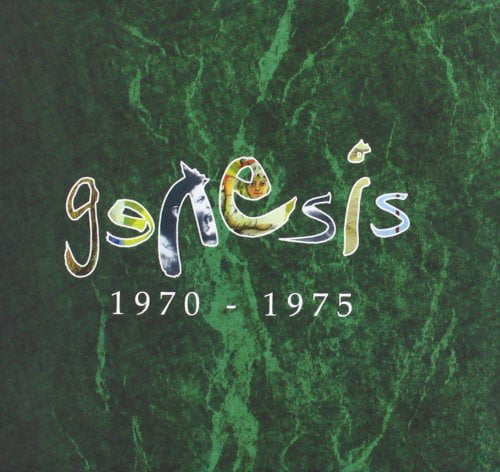
2008, 7/10
The Genesis 1970–1975 Box Set provided 7 CDs and 6 DVDs of Genesis material. The first six CDs cover the studio albums from Trespass to Lamb, while the seventh covers b-sides and rarities. At ten songs and forty-six minutes, it works as a standalone album in its own right. Surprisingly, most of the tracks are drawn from the Ant Phillips and John Mayhew era of the band.
Recorded by the Collins and Hackett lineup, ‘Twilight Alehouse’ is the centrepiece here, a song written in 1970, recorded in the Foxtrot sessions, and issued as a b-side in 1973. ‘Happy the Man’ is a non-album single from 1972, while the four closing songs were taken from Genesis Plays Jackson – recorded in 1970 with Paul Samwell-Smith for a BBC documentary about painter Michael Jackson that never aired. While the tapes weren’t recovered until 2006, most of these pieces were later recycled into other Genesis songs – ‘Frustration’ became ‘Anyway’ from Lamb, while ‘Manipulation’ was assimilated into ‘The Musical Box’. ‘Going Out To Get You’ is a 1969 demo with Gabriel’s vocals at their most unhinged, while ‘Shepherd’, ‘Pacidy’, and ‘Let Us Now Make Love’ come from a 1970 BBC session, and are more straightforward constructions than the material from Trespass the same year.
If you’re a big fan of Gabriel-era Genesis, there’s some fascinating material on Extra Tracks 1970 to 1975 – it shows how many of the band’s ideas originated back in 1970.
A Trick Of The Tail
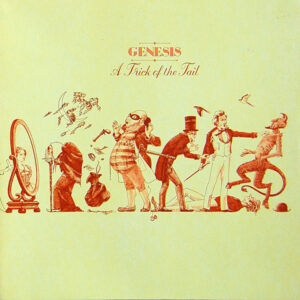
1976, 8.5/10
After unsuccessfully holding auditions to replace Peter Gabriel, Phil Collins took over lead vocals for Genesis. He’s very similar to Gabriel on the progressive material of A Trick Of The Tail. The 12-string guitars of pastoral Genesis have mostly disappeared, and A Trick Of The Tail sounds like a more relaxed version of The Lamb Lies Down on Broadway, with most of the textures coming from Banks’ synthesizers.
Even though the lyrics are more generic without Gabriel, the songwriting on A Trick Of The Tail is still impressive. ‘Dance On A Volcano’ is an engaging opener with a tension between the taut verses and the spiralling chorus. ‘Squonk’ is a convincing faux-mythological lyric, with Collins throwing his voice around like Gabriel. ‘Ripples’ is a gorgeous ballad, written by Mike Rutherford about ageing, while ‘Mad Man Moon’ starts off as a pretty piano piece.
Despite the absence of Gabriel, A Trick Of The Tail is still one of Genesis’ strongest albums.
Wind & Wuthering
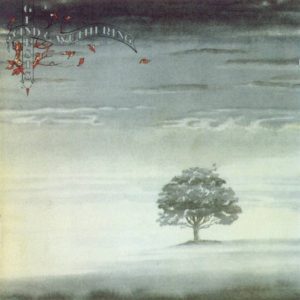
1976, 6/10
Their last studio record as a quartet, Wind & Wuthering was released in mid-December 1976, symbolically a few weeks before the year of punk in the U.K.. While A Trick of the Tail stands proudly alongside the best of the Peter Gabriel albums, Wind & Wuthering matches a weak set of songs with a monotonous, synth-dominated sound.
‘The Eleventh Earl Of Mar’, about the 1715 Scottish uprising, gets Wind & Wuthering off to an excellent start, and would have fitted well onto Trick of the Tail. The other two successful songs are Rutherford’s ‘Your Own Special Way?’ and Hackett and Collins’ ‘Blood On The Rooftops’. Both are relatively straightforward; the former is a pleasantly countrified love song.
Elsewhere, there are failed ideas, like Banks’ rambling messianic epic ‘One For The Vine’. ‘All In A Mouse’s Night’ is a dramatic rodential tale that might have worked with Gabriel fronting it. The instrumentals are unremarkable.
Wind & Wuthering still has enough of the classic Genesis sound to compare with their earlier albums, but it’s not as consistent as their best work.
Spot the Pigeon
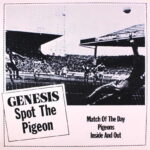
1977, not rated
Wind & Wuthering isn’t very consistent, so the idea of listening to an outtakes EP isn’t very alluring. It’s more interesting than it sounds. The two songs on the first side are too light-hearted to fit on a Genesis album, particularly the silly ‘Match of the Day’, but they successfully showcase a poppier side of the band. The second side’s ‘Inside and Out’ is a lost gem that should have included on the record itself.
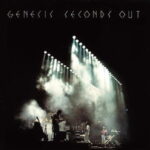
Seconds Out
1977, not rated
Genesis’ second live album was primarily recorded at Palais des Sports, Paris, during the Wind & Wuthering tour in June 1977. It was the last Genesis album to feature Hackett, who left during the mixing of the album. Chester Thompson is on drums, apart from Bill Bruford on a 1976 rendition of ‘The Cinema Show’.
…And Then There Were Three…
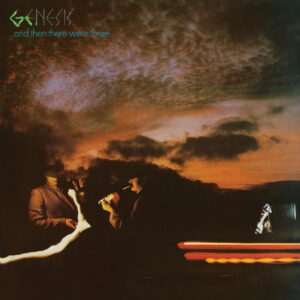
1978, 7/10
As the title implies, …And Then There Were Three… was Genesis’ first album as a trio. The record contained the band’s first top ten UK hit, ‘Follow You Follow Me’, with lyrics written by Rutherford. It’s a catchy pop song, presenting Collins’ accomplished drumming and Banks’ burbling synths in an attractive package, but it’s not indicative of the rest of the record. The remainder of …And Then There Were Three… continues the progressive rock of previous releases. For the last time on a Genesis record, it feels like Gabriel and Hackett are present in spirit – Collins’ vocals sometimes still recall Gabriel, while Rutherford’s lead guitar work isn’t as idiosyncratic as Hackett’s but sounds similar.
…And Then There Were Three… has weaknesses – it’s overlong at 51 minutes and 11 tracks, it doesn’t break any new ground for the group, and it sounds homogenous with everything smothered in Banks’ synths. But at the same time, the record is consistent and tuneful, and there’s enough dynamism from Collins’ drumming to keep it interesting. Banks’ songs ‘Burning Rope’, ‘Undertow’, and ‘The Lady Lies’ are much stronger than his contributions to Wind & Wuthering. Rutherford’s ‘Snowbound’ is pretty, while songs like ‘Ballad of Big’ and ‘Deep in the Motherlode’ retain the epic sweep and tunefulness of prog-era Genesis.
…And Then There Were Three… is an enjoyable record; the first ten tracks serve as a recap of Genesis’ progressive rock era, while the eleventh points the way forward.
Duke
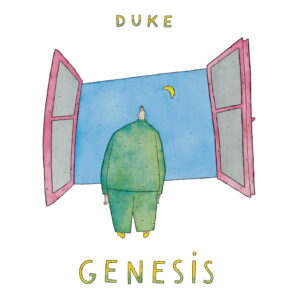
1980, 8.5/10
Genesis were on hiatus during early 1979 – Rutherford and Banks worked on solo albums, while Collins moved to Vancouver in an effort to revive his failing marriage. When the band reconvened, Collins had a stockpile of material, some of which later went to his first solo album. The emergence of Collins as a writer balanced the band dynamics – the three writers contributed evenly for the next decade, making Genesis an enticing creative outlet for Collins even while he was enjoying solo mega-stardom. Like Genesis’ next couple of albums, Duke occupies a fascinating space between progressive rock and pop, with punchy pop songs like ‘Misunderstanding’ sharing space with lengthy instrumentals like ‘Duke’s Travels’.
Five of the album’s tracks were originally conceived as one long suite – the opening trio of ‘Behind the Lines’, ‘Duchess’, and ‘Guide Vocal’, and the closing pair of ‘Duke’s Travels’ and ‘Duke’s End’. The hit ‘Turn It On Again’, notable for cramming a very sophisticated chord sequence into an accessible pop song, was also developed from a link section in the suite. Collins’ ‘Misunderstanding’ was inspired by The Beach Boys’ ‘Sail On, Sailor’ – it’s the most overtly fun song here, but it works. Rutherford’s melody writing is strong on ‘Man Of Our Times’ and ‘Alone Tonight’, while Banks writes flashy and compact pop songs on ‘Heathaze’ and ‘Cul-De-Sac’.
Duke is an impressive revitalisation from Genesis after a couple of albums that suggested they were painting themselves into a corner.
ABACAB
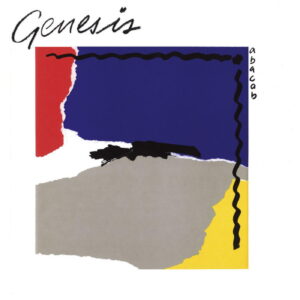
1981, 8/10
After recording Duke, Phil Collins became a solo superstar with Face Value and ‘In The Air Tonight’. Genesis reconvened in Surrey, recording in their own studio for the first time. The trio made a conscious effort to jettison material that was too close to music they’d made previously. Like Duke, ABACAB is a fascinating record that blurs the lines between prog and pop. Songs like ‘No Reply At All’ and ‘Man on the Corner’ would have fitted onto a Collins solo project, while ‘Dodo/Lurker’ recalls ‘Squonk’ from A Trick of the Tail.
The group also experiment with new wave – the excellent ‘Keep It Dark’ maintains a dark intensity. The Earth, Wind & Fire horns punctuate ‘No Reply at All’, while the title track was a top ten hit despite its unsettling feel. Most songs are group compositions, but each member also contributed a solo composition – Banks’ ‘Me and Sarah Jane’ is a winding progressive composition that never gets too bombastic, Collins’ ‘Man on the Corner’ is pretty, while Rutherford’s ‘Like It Or Not’ is a strong pop tune buried toward the end of the record. There is one misstep – ‘Who Dunnit’ is a repetitive jam that doesn’t stand up to repeated listens.
ABACAB is a fascinating record, a talented trio enjoying commercial success while making wide-ranging music.
3×3
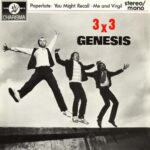
1982, not yet rated
Three-song EP with outtakes from ABACAB. ‘Paperlate’, with the Earth, Wind & Fire horns, is the best-known song.
Three Sides Live
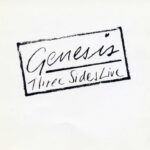
1982
Live album which focuses on material from Duke and ABACAB. The North American edition originally contained the three tracks of 3×3 and two b-sides from Duke.
Extra Tracks 1976–1982
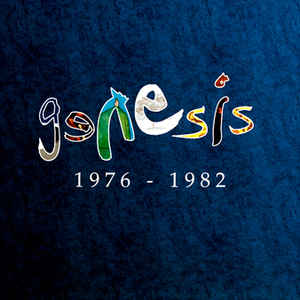
2007, 7.5/10
The sixth disc of the band’s 1976-1982 retrospective boxset captures all the miscellaneous material from the era. It’s stylistically diverse, as it picks different points from the band’s evolution, but a lot of this material is remarkably strong for outtakes. Wind & Wuthering would have been much stronger had it included ‘Inside & Out’ and ‘It’s Yourself’. ‘Pigeons’ and the silly ‘Match of the Day’ wouldn’t have fit on an album, but they’re tuneful tracks that are worth preserving.
ABACAB had enough material for a double album, and tracks were chosen on the basis of bringing something new to the table. ‘You Might Recall’ and ‘Paperlate’ both sound like potential hit singles, but were relegated to the 3×3 EP. ‘Naminanu’ and ‘Submarine’ were planned as part of a suite with ‘Dodo/Lurker’. Keyboardist Tony Banks’ ‘Evidence of Autumn’, a b-side from the Duke era, is lovely.
If you enjoy Genesis’ transition years, it’s worth seeking out these extra tracks.
Genesis
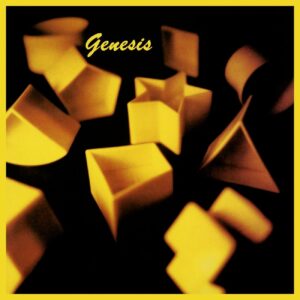
1983, 7.5/10
Genesis came into sessions for their twelfth album with no material prepared in advance, opting to compose together. The group were able to take their time and develop ideas through jamming – like ABACAB, Genesis was written and recorded in group’s studio, The Farm, in Chiddingfold, Surrey. The title Genesis is indicative of the group’s collaborative spirit.
The first side is a contender for Genesis’ best ever; the pair of songs ‘Home By The Sea’ and ‘Second Home By The Sea’ do a great job of bringing progressive Genesis into the 1980s, with their haunting melody. The unsettling ‘Mama’, with psychotic laughing from Collins, was the lead single, although the catchy groove of ‘That’s All’ is also memorable. The second half of Genesis is less consistent, particularly Collins’ accent on the painful ‘Illegal Alien’, but it’s generally tuneful enough to be entertaining.
Genesis has some great material, and it sounds inspired for a band nearly 15 years into their recording career.
Invisible Touch
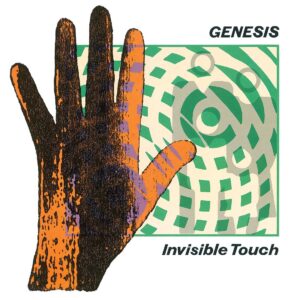
1986, 6.5/10
Genesis enjoyed an unlikely rise from obscurity to mega-stardom – in the early 1970s they were playing long-winding songs to small audiences and relying on food parcels from their parents. By the mid-1980s they were everywhere – in 1985 Collins released the transatlantic chart-topper No Jacket Required, while Rutherford scored multiple US top ten hits with Mike and the Mechanics. 1986’s Invisible Touch is beloved by Patrick Bateman, who labelled it the band’s “undisputed masterpiece”. I think the material is mostly strong, but it suffers a little from overly straightforward arrangements.
Even if you’ve never heard this record, you probably know more than half of these songs – Invisible Touch was Genesis’ only US number-one hit, while ‘Throwing It All Away’, ‘In Too Deep’, ‘Land of Confusion’, and ‘Tonight, Tonight, Tonight’ all placed inside the US top 5. ‘In Too Deep’ is too close to a sappy Phil Collins ballad to fit comfortably on a Genesis record, but generally these are good tunes. In particular, ‘Invisible Touch’ is a great pop tune and ‘Throwing It All Away’ features some pretty Rutherford guitar. Of the deep cuts, ‘Anything She Does’ is strangely hyperactive, ‘Domino’ is a noble attempt at progressive rock, and ‘The Brazilian’ is a fun instrumental.
The straightforward arrangements and radio-friendly production of Invisible Touch frustrate my inner music nerd, but there’s a solid core of tunes here.
We Can’t Dance
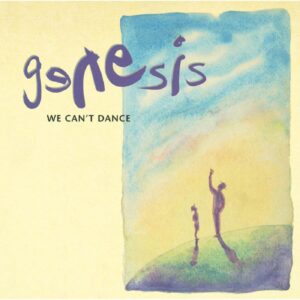
1991, 4.5/10
After another lengthy hiatus, Genesis returned in the era of CD-bloat. Like the two previous records, it was composed and recorded by the trio in their studio. Despite the group credits, Collins, coming off the success of …But Seriously, sounds much more dominant than before. Songs like ‘Tell Me Why’ and ‘Hold On My Heart’ feel like Collins’ solo numbers. We Can’t Dance has some genuinely inspired moments for a band in their fourth decade, but there aren’t enough of them to sustain a 71-minute running time.
Opener ‘No Son of Mine’ is one of Genesis’ best songs from the trio era, brooding and sinister. It withholds the chorus until the song’s already been running for a couple of minutes. ‘Never A Time’ is an adult contemporary ballad, but that melody is sumptuous. Hit singles ‘I Can’t Dance’ and ‘Jesus He Knows Me’ are memorable but gimmicky. Lengthy tracks ‘Driving The Last Spike’ and ‘Fading Lights’ don’t have the melodic heft to justify their lengths.
We Can’t Dance is way too long, and infested with polite adult-contemporary. But it has a couple of excellent songs tucked away in its lengthy grooves.
Live: The Way We Walk
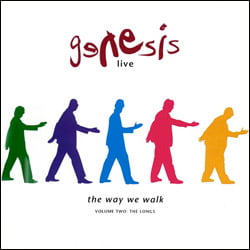
1992
Two live volumes, mainly drawn from the We Can’t Dance tour, divided into “shorts” and “longs”. I haven’t heard this, but not for lack of trying – when I was 13 I tried to buy volume 1, my dad was unsure about whether “that Genesis outfit” were suitable….
Calling All Stations
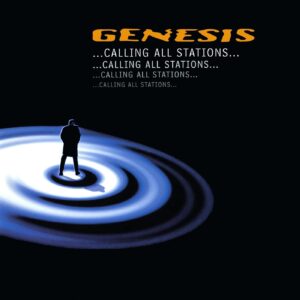
1997, 2/10
After years of enjoying a duel career as a solo superstar and lead singer for Genesis, Phil Collins announced his departure from Genesis in 1996. Banks and Rutherford opted to continue the band, holding auditions for lead singer – former Stiltskin singer Ray Wilson was chosen over David Langdon (later to join Big Big Train). Calling All Stations features Israeli session drummer Nir Zidkyahu and American drummer Nick D’Virgilio. Banks and Rutherford wrote most of the material for Calling All Stations before a new singer was selected. It’s therefore difficult to blame Wilson for the failure of this record, although it makes it clear that both Gabriel and Collins were gifted singers who were able to bring both weirdness and sincerity to Banks and Rutherford’s songs.
With the less nuanced vocals of Wilson and unimaginative stadium rock production, Calling All Stations sounds like the work of an unconvincing Marillion tribute band – vapid adult contemporary, with Hallmark sentiments. Like everything else from Genesis, Calling All Stations is tuneful enough – ‘Congo’ sounds fine on the Turn It On Again compilation – but a whole album of hollow stadium rock is difficult listening.
Genesis had carried on successfully without key members before, but this time it didn’t work; Calling All Stations would have made more sense if it had been released under a different band name. It’s a limp end to a terrific career.
Turn It On Again: The Hits
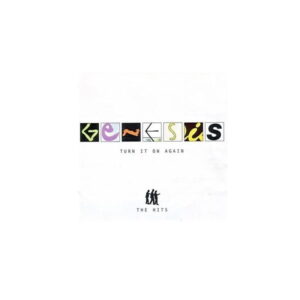
1999, not rated
Greatest hits compilation – it’s not effective as a career overview, as the majority of these songs come from 1983 or later. But it’s a good shortcut to the group’s less consistent later albums. The rarity to entice collectors is a respectable 1999 remake of ‘The Carpet Crawlers’, with Hackett, Gabriel, and Collins all present – Gabriel and Collins share lead vocals. Elsewhere, Gabriel only sings lead on ‘I Know What I Like (In Your Wardrobe)’, while the Ray Wilson era is represented by ‘Congo’.
Ten Favourite Genesis Prog-Era Songs
Supper’s Ready
Lilywhite Lilith
The Cinema Show
Dancing With The Moonlit Knight
The Carpet Crawlers
The Lamia
Can-Utility and the Coastliners
Dance on a Volcano
I Know What I Like (In Your Wardrobe)
Ripples
Ten Best Genesis Pop-Era Songs
Home By The Sea
Turn It On Again
No Son Of Mine
Follow You Follow Me
ABACAB
Dodo/Lurker
Mama
Invisible Touch
Misunderstanding
Paperlate
Back to 1970s Album Reviews….
10 Comments
Leave a Reply
Related Pages
Review Pages
Read about the discographies of musical acts from the 1960s to the present day. Browse this site's review archives or enjoy these random selections:
Blog Posts
I add new blog posts to this website every week. Browse the archives or enjoy these random selections:
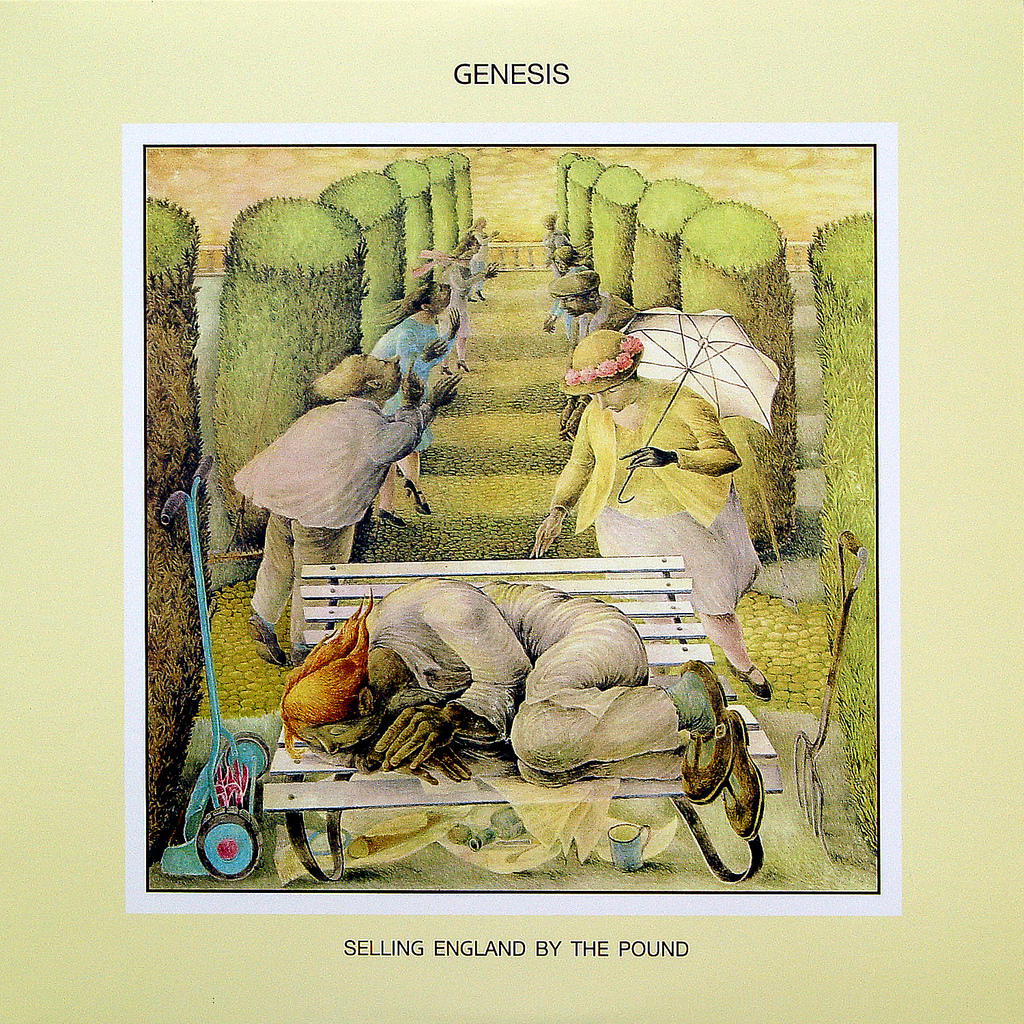
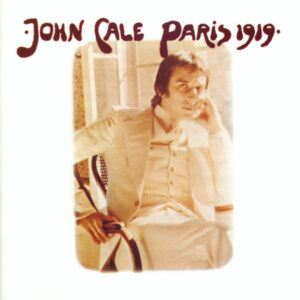
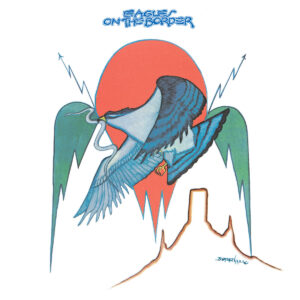

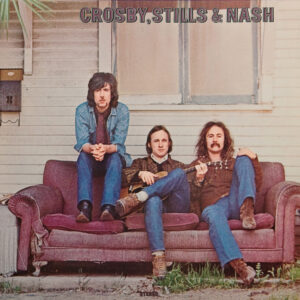

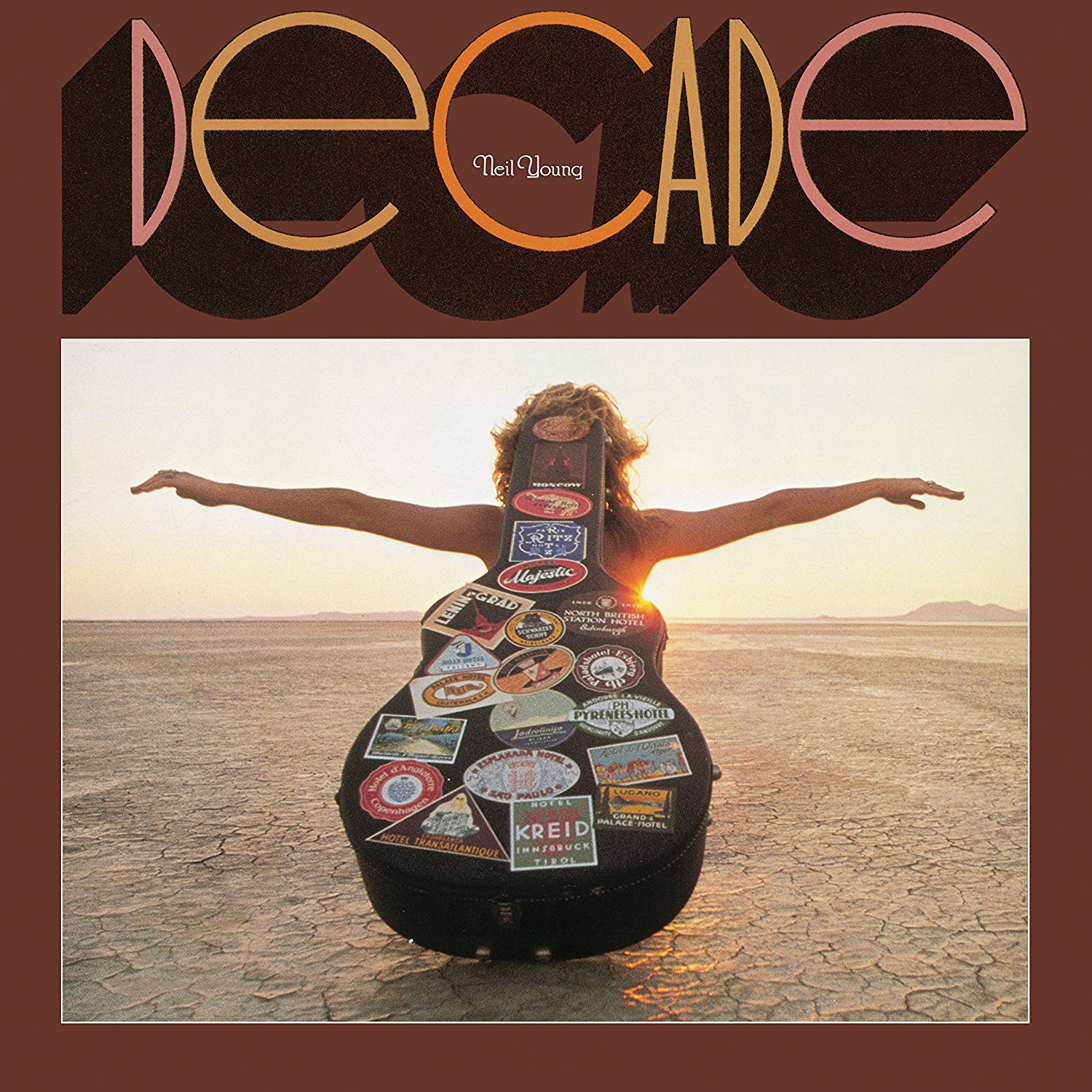

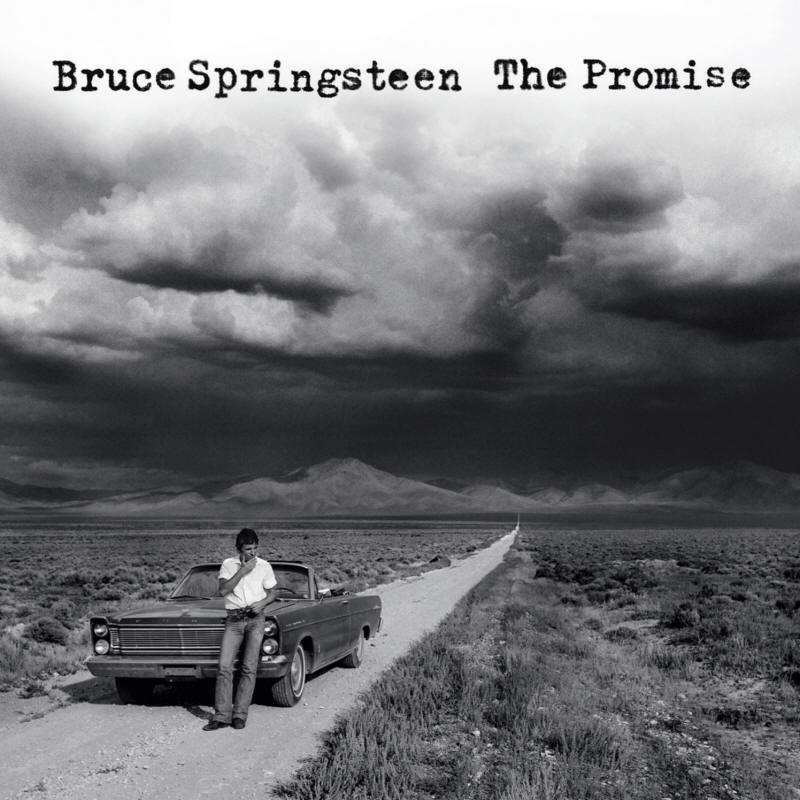


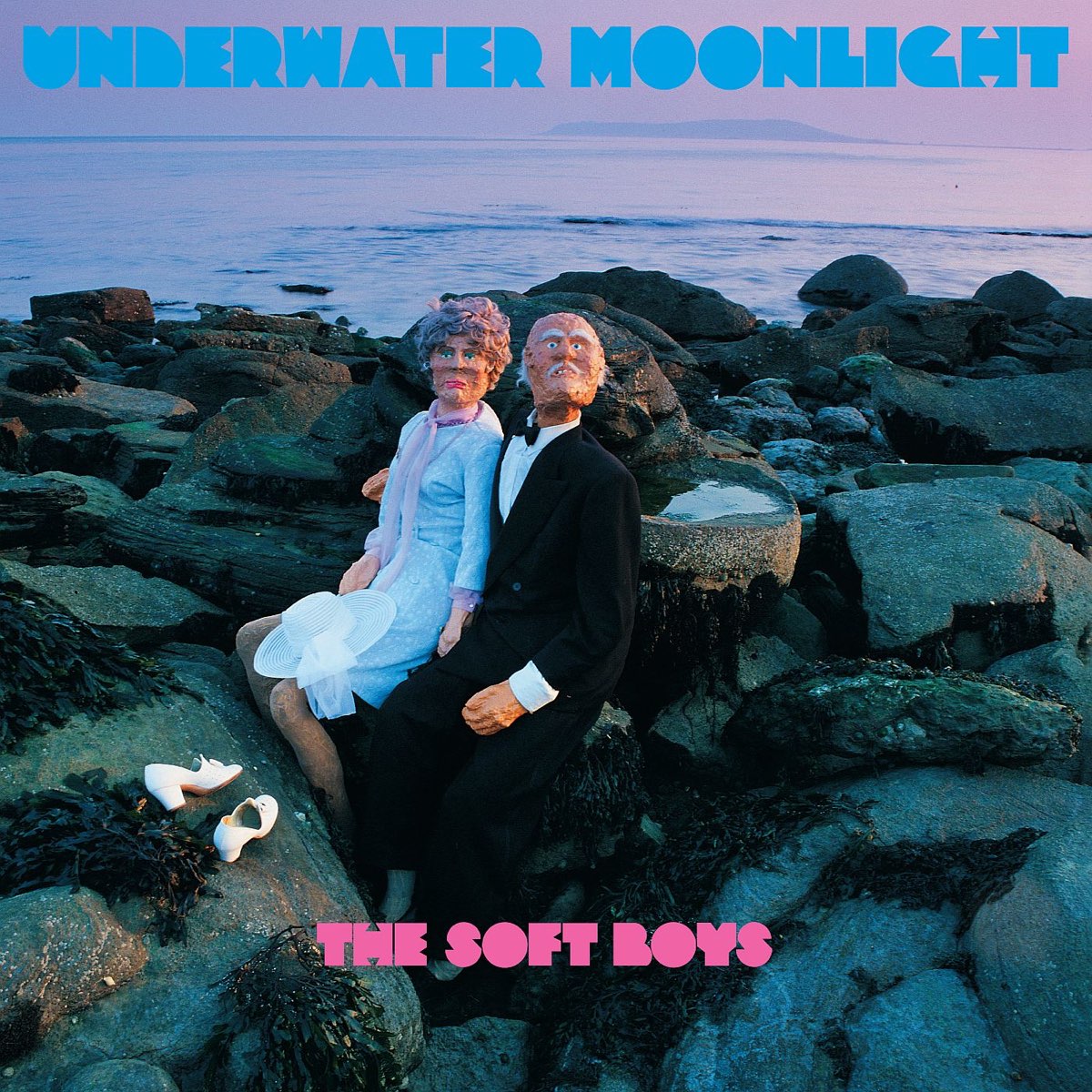

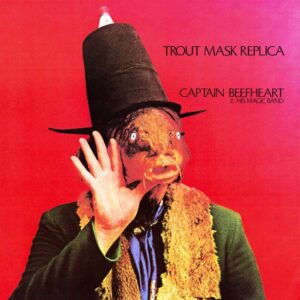
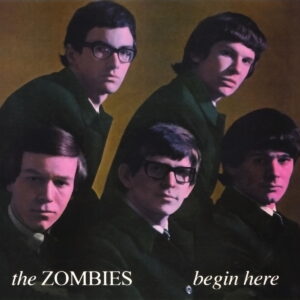

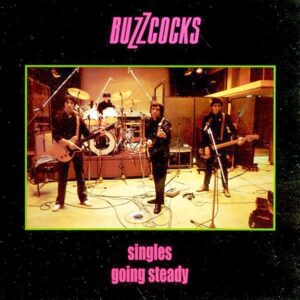







Good overview. The tale of two bands (similar to Fleetwood Mac and others). I was listening to these guys a lot when Gabriel was in the band. I was forgiving of whatever weaknesses there were. There was so much that my teenage brain liked. I’ll go through the albums so bear with me. I can’t pass them over.
Genesis is one of those bands I always wanted to like, but just don’t.
They’re pretty similar to Moody Blues in a way – very English, flute and keyboards. I really like the early material when they were a prog band.
Yes, Supper’s Ready belongs at the top. But surprised not to see “Fifth of Firth” — maybe I am biased as I learned the piano part several years ago, and have to play it every so often to keep it memorized.
I like trying to play it too. The piano into is my favourite part though – I really struggle with the lyrics and the long guitar solo.
Top 10 Genesis
I Know What I Like (In Your Wardrobe)
The Lamb Lies Down On Broadway
Carpet Crawlers
Abacab
Turn it on again
Paperlate
Invisible Touch
Watcher of the Skies
Mama
That’s All
I need to go back and fill in the gaps on this page – the late 1970s and early 1980s stuff. I don’t know if I would fit much past Trick of the Tail in a top ten – I really like songs like Turn It On Again (and actually No Son of Mine from the 1990s) but still might struggle to force its way in past the prog stuff.
I was never really a huge fan of either the early years or their later years, and I can’t say that there’s anything beyond the ones I have listed here that I really like. But I never mind hearing any of these ones.
Useful review Graham. I like that you don’t just dismiss all the post ’70s albums. I have hardly heard any of them myself but your write up has encouraged me to investigate. I was pleasantly surprised when I first heard the 3 post Gabriel albums up to Duke.
I was very impressed by Duke, most of ABACAB, and the first side of Genesis – there’s lots of good stuff there.